- Home
- Allison Brennan
Nothing to Hide Page 3
Nothing to Hide Read online
Page 3
“We need to make a list of ways these men could have known each other, over and above the obvious like church or employer or gym.”
“Like if they all witnessed a crime. Or were on a jury together.”
“Exactly. Maybe they went to the same concert, took a continuing education class. Or perhaps the wives are connected and that’s how the killer is targeting his victims. Did the other two men have children?”
“Steven James has a daughter, freshman in high school. Standish has no kids.”
Jerry pulled up next to Lucy’s vehicle at the park. Nearly everyone was gone from the crime scene, though a two-person patrol remained to keep the park closed. CSI would release the scene as soon as they confirmed they had everything they needed.
“You know, Kincaid,” Jerry said, “a random serial killer is not unheard of.”
“I sincerely hope that’s not what we’re dealing with.” Some serial killers might seem random, but most weren’t. They were generally organized and targeted a specific type of person—in this case married men. But married men was far too broad a category for a traditional serial killer. Maybe the killer didn’t know these men were married. A killer driving around, looking for a male driving alone? That would lend to the theory that the killer was a cop or impersonating a cop—pulling over a vehicle. But if the victim was summoned by someone pretending to be in trouble, then the killer knew when and where the victim was going to be in order to set the trap.
Jerry concurred. “It’s like the sniper in DC—if anyone can be a target, everyone panics.”
“That, and a truly random killer is going to be much harder to find until he messes up. No fingerprints have been found at any scene, no weapon, no witness has come forward. Nothing that connects to the killer other than the MO. And the MO doesn’t make sense right now. Is it sexually motivated or revenge? Targeting the hands indicates theft of some sort, stealing—targeting the groin indicates a sex crime. But both? It feels … unnecessary. Then the final gunshot? To ensure they are dead? I don’t know.” Lucy paused, thinking things through, but not seeing any answers. “I want to be there during the autopsy. Would you object?”
“We don’t routinely observe autopsies, even homicides. The procedure is recorded.”
“Still—I need to see exactly what was done to the bodies. It’ll help me.”
“Help you how?”
“Get inside the killer’s head.”
“Psych mumbo jumbo,” he said.
Lucy shook her head. “And here I thought we were getting along.”
“Sorry,” he said, though he didn’t sound like he meant it. “You seem like a smart cop. I just don’t really cotton to the whole my daddy hit me so now I kill people it’s not my fault mentality.”
Lucy almost smiled. “Well, it’s a lot more complicated than that.”
“And I don’t want to give the defense any reason to get the guy off.”
“Most serial killers are sane by legal standards.”
“You want to watch the autopsy, go right ahead. Might even be this afternoon. I’ll call over there and find out their timetable.”
“Thank you. And in the meantime, I’d like to review the complete case files of the first two murders.”
“And I’ll get started on paperwork. I don’t know about you feds, but we spend more time filling out forms than hitting the ground.”
“Another thing we have in common,” Lucy said.
CHAPTER THREE
Saturday Afternoon
The sheriff’s office was in the city of San Antonio adjacent to the detention center. It was a sturdy brick multistory building in the middle of a light industrial area, right off the freeway. Lucy had been to the jail a few times to interview suspects, but she’d never had cause to go into the station.
The sheriff was responsible for the county jails and court security, but also maintained patrols and investigative units throughout the entire county, not just the unincorporated areas. The local FBI office worked with both the city police and the sheriff, and had a good relationship with each office, save for—apparently—Jerry Walker.
Jerry handed Lucy a visitor’s pass and led her upstairs and down the hall to the homicide unit’s small corner of the building. No other detectives were at their desks.
Jerry had his own small office, a sign of seniority. He could be the lead investigator—it wouldn’t surprise her considering his years of service.
He flipped on the light and pointed to two tall, unorganized stacks of files. “Hardcopies. You’ve seen the important points in the information we sent over to the FBI.”
“Which wasn’t complete.”
He didn’t comment.
She glanced around. There was a chair for her, but no place to review the files. “Do you have access to a conference room that we can use for a couple of days? Just to spread out a bit. I’ve found that looking at the evidence side by side can help.”
“To each his—or her—own,” Jerry said. “I can grab a conference room, but I don’t know how long I can keep it. We don’t have the space around here.”
“We can set up at the FBI, we have a room I can use for the duration of the investigation.”
As soon as the words left her mouth, she wished she could take them back. Jerry stared at her, eyes narrowed, once again suspicious. “Not going to happen, Kincaid,” he said. “I’ll get permission to use a room for the duration of this investigation, if I have to. Grab those.” He took one of the two stacks, gesturing toward the other.
She followed him down the hall. He looked into several rooms before pushing open the door of a small room with a lone narrow window and a table that could seat four people if they crammed. “We can use this.” He dumped the files on the table.
She wasn’t going to complain. There was a floor-to-ceiling whiteboard on one wall that would be useful.
“Since I already know what’s in these files, I’m going to grab a sandwich. Can I get you something?”
She wasn’t hungry, but she didn’t know when she’d be able to get lunch, so she said, “That would be great, thank you.”
“Anything specific?”
“I’ll eat almost anything.”
“I’ll be back in a few.” He stepped out, closing the door behind him.
She sighed. Back to square one. She hated walking on eggshells around people, and she really wanted to know what had happened between Jerry and the FBI in the past. It might help her understand why he was so hostile toward her.
Lucy sat down with the files and in minutes forgot about Jerry and his issue with her and the FBI. She started mapping out the crime scenes and the assault on each victim and couldn’t shake the belief that these three murders simply made no sense.
Jerry had already done an extensive amount of work. When the first victim turned up—Billy Joe Standish, also killed on a Friday night—the police thought it was a personal attack. Standish had been beaten by the side of the road and shot. They interviewed everyone he worked with, his wife, his family, his neighbors. Standish had a reputation for drinking on the weekends and had two misdemeanor charges for fighting. But there had been no brawls in the last year, and no one had any idea who would want him dead. He had no alcohol or drugs in his system. They interviewed people in the area, both residents and businesses, to see if there had been any recent break-ins—perhaps Standish had seen something. Because even though he had a reputation for being a weekend partier, he was a charitable guy—he’d spent a week in Houston after the flood helping rescue stranded families. So it wasn’t a stretch to think that if he saw someone breaking into a business, he might do something about it.
Except, nothing. No break-ins in months, and he was killed nearly half a mile from any private residence. The quarry near where his body was found was empty at night and never had cash or unsecured equipment on the premises.
Jerry had made notes to talk to the wife again about any threats—he’d asked her once, she couldn’t think of any, but he al
so noted that she became hysterical the two times he talked to her. When the second victim turned up, Jerry apparently hadn’t followed up with Susan Standish again. The case took a different direction, and Jerry worked diligently to try to find a connection between Standish and James.
There was not one connection that he could find. They didn’t go to the same church (James didn’t go to church at all; Standish went sporadically); they didn’t run in the same circles (James was white collar, upper middle class—Standish blue collar, barely making it). Not the same doctor, not the same dentist, not the same vet. (James had a cat; Standish had two yellow Labs). They lived in different communities. Susan worked at an elementary school, but not in the same district that the James kid attended, and they didn’t drive the same type of car. Standish was Ford; James was Toyota. They had no friends in common.
And now a third victim, who seemingly had no connection with the first two.
* * *
The basement—which had high, ground-level windows so it didn’t feel like you were buried—had a decent cafeteria set up like an old-fashioned diner with hamburgers, a soup of the day, a salad bar, and sandwiches. The specialty was a club sandwich, but Jerry’s favorite was the seasonal turkey—from October 1 through New Year’s, the cook offered a carved turkey, stuffing, and homemade cranberry sauce sandwich that was to die for. Ten more days, Jerry thought. The food was fresh and reasonably priced, and Jerry was all about good, cheap food.
He had a headache, so he dry-swallowed three aspirin while he waited in the short line—short since it was both Saturday and after the lunch rush.
Doris Jackson had worked in the cafeteria since before Jerry became a cop, and considering he’d been here for twenty years, that was forever. She knew every cop by name, always had a smile, and while she didn’t gossip, she knew everything that went on in the sheriff’s office. If there was an officer down, she worried and fretted with the rest of them, always preparing sandwiches and snacks to take to the hospital. When the sheriff found out that Doris was spending her own money to feed grieving cops, he created a fund to cover the cost. Everyone had assumed that the cafeteria—which was run by the county—took care of the expense. Doris had shunned a tip jar for years, but the sheriff bolted one to the register. “You and your crew deserve it.” Then he put the word out that everyone could spare a dollar a day.
“What are you feeling like today, Mr. Jerry?” Doris asked.
“Meatball sub.” He needed something substantial because he’d eaten breakfast on the run.
He didn’t know what to get Agent Kincaid.
“You need something else?”
“A fed I’m working with on this case. She said get her anything.”
“Club is always a winner.”
“One of those, then.”
Doris smiled, called out the order to the chef, and Jerry paid her. He slipped two bucks in the tip jar.
He stood aside and waited, checking his phone. He texted Jeanie, his wife, that he didn’t know when he’d be home, probably not before six, and he’d call later. It was Saturday and she was used to his erratic schedule.
He had to get out of this mood. Kincaid was young and a rookie, but she didn’t seem like an idiot. He simply didn’t want to work with the feds. He knew he had a bias, but at the same time he had a hard time forgiving the local FBI office for their screwup.
Kincaid wasn’t even here. Hell, she was probably still in high school.
He’d told Kincaid that the FBI messed up two of his cases, and that wasn’t a lie, but it was only the one—the kidnapping that ended in the death of two young boys—that soured him on his federal counterpart. The FBI had never admitted they made a critical and fatal error.
The agent in charge of that investigation had left the bureau, last Jerry heard, but that didn’t make the situation any better. He’d had ten years to fume. The feds had dismissed his concerns about their approach. The whole case was a mess, but he had known they were going to get those boys killed. He knew it and he fought them and they’d removed him from the case. Just taken him out of the equation. Yes he lost his temper, but the lives of two kids were at stake. He couldn’t sit back and let it happen.
He was removed and the FBI didn’t truly understand the situation because they didn’t listen to him—that agent didn’t listen to him—and Jerry had never forgiven them. Never. Because had they realized the situation wasn’t as it appeared to be, those boys might be alive today.
None of that was Kincaid’s fault, and he was trying to separate the cases. But the whole psychology crap irritated him. That was exactly what the feds said ten years ago, that the kidnapper—a relative of the family—wouldn’t hurt the boys. There had been no sign of violence, nothing in the kidnapper’s psychology that suggested she would hurt her nephews. It was a family dispute, and the FBI was so damn confident in their theory, they made several missteps.
One thing Jerry knew was people. He may not have graduated from a prestigious university—got his AA at SAC, the oldest community college in Texas, right here in San Antonio—but he wasn’t an idiot. He might not be able to throw around the latest terms of misbehavior, but he understood people. He knew criminals and victims. He understood motivations, maybe not able to articulate them like some folk, but he knew in his gut. And when he was first on the scene when those two boys were grabbed by their aunt on their way to school, he knew something was different about this case. Something wasn’t adding up. But because he couldn’t give the jerks at the FBI more than his gut impression based on years of police work and talking to thousands of people on the street as first a beat cop then an investigator, well, they completely dismissed him.
“Jerry,” Doris called out, a bag packed with his order.
He walked over to the pickup.
“You’re a million miles away,” Doris said.
“Thinking about a tough case.”
“I heard about it.”
“You did?”
“Three men, same killer.”
“Looks that way.”
“You’ll get him. I know you will.”
He smiled. “Glad for your confidence, Doris.”
“But that ain’t what put the frown on your face,” she added. “You’re thinking about those boys again.”
Sometimes, Doris seemed downright psychic.
“The feds are all over this.”
“Same one?”
“No.”
“Well, that’s your answer, ain’t it?”
He didn’t know that there had been a question, but Doris had a long memory. He hadn’t been in a good place ten years ago after the kidnapping and murders. He nearly got himself fired. Started drinking heavily, was angry and temperamental and put himself and others at risk. He’d ended up taking a month off and got his life back together, thanks mostly to his boss, and his wife. His boss told him to get his act together or he was gone. First half of the wake-up call. So he took leave, and Jeanie was a rock. Firm when he was angry, sympathetic when he blubbered like a kid. She probably should have left him, he was so moody, but she pulled him out of his hole. He loved her more now than he did when they’d married twenty-seven years ago.
The thing was—he had mostly accepted the outcome of the Barton kidnapping. He’d done everything in his power to fix it, he knew—and they shut him out. That wasn’t on him. But he couldn’t put aside how the FBI had screwed everything up.
He was just waiting for Lucy Kincaid to do the same thing. Only now, because he maintained control of the case, she didn’t have the final say. She didn’t have the authority. And if she overstepped, he would cut her out so fast her little rookie head would spin.
* * *
Lucy jumped when the door opened. She felt foolish, but she was so immersed in reading the files and taking notes that she almost forgot where she was.
“Excuse me,” a tall, lean female deputy in uniform said as she entered. “I’m Assistant Sheriff Maria Jimenez. I oversee the investigative uni
t. I spoke to your boss this morning, wanted to introduce myself since we haven’t had the pleasure.”
Lucy stood and shook her hand. “Lucy Kincaid. Nice to meet you.”
“You’ve been busy,” she said, waving her hand to the stacks of papers Lucy had set out. Lucy had rearranged the files to better help her see patterns.
“I’m visual,” Lucy said.
Maria glanced down the hall, then shut the door. “I know that Jerry has been fighting sharing this investigation, but the sheriff and I agree that we need all hands with this, especially now after a third body dropped. Just so you know, Jerry Walker is hands down the best investigator we have in our office. The strongest combination of experience and instincts. I understand that he’s been distant and nonresponsive the last two weeks, but I talked to him this morning and want to make sure you understand that the FBI is welcome in our investigation. My office has an outstanding relationship with your office, and your reputation precedes you. You have a lot of friends in SAPD. If you have any issues, please let me know.”
“If I have any issues with Investigator Walker, I’ll talk to him about it,” Lucy said. She wasn’t going to go running to Jerry’s boss because he was a jerk. “It might help if I understood his animosity toward my office. He said the FBI messed with two of his investigations.”
Maria hedged. “They may have, but only one affected him. It was before my time. I was in the military stationed overseas so all I know is rumor and innuendo, which I won’t repeat. As far as Jerry is concerned, he felt that the FBI made a fatal tactical error on a kidnapping case. He recognizes that it was the agent in charge of the investigation, but he blamed everyone and the aftermath was difficult.”
Lucy needed to know more about that case.
The door opened and Jerry walked in with a bag. He glanced at Lucy, then nodded to his boss. “Maria. I emailed you a preliminary report.”
“Got it. Just wanted to introduce myself to Agent Kincaid. Let me know what you need, Jerry—the sheriff is getting press calls, wants to have a press conference on Monday with something.”

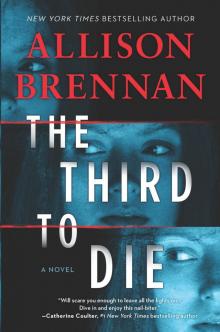 The Third to Die
The Third to Die Nothing to Hide
Nothing to Hide No Way Out
No Way Out Cold as Ice
Cold as Ice Cut and Run
Cut and Run No Way Out (Lucy Kincaid Novels)
No Way Out (Lucy Kincaid Novels) Storm Warning
Storm Warning Betrayed: Powerful Stories of Kick-Ass Crime Survivors
Betrayed: Powerful Stories of Kick-Ass Crime Survivors Killing Fear pb-1
Killing Fear pb-1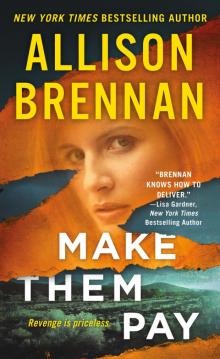 Make Them Pay
Make Them Pay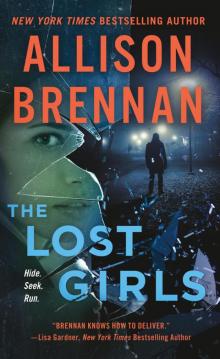 The Lost Girls
The Lost Girls Stalked
Stalked Killing Justice
Killing Justice A Deeper Fear
A Deeper Fear Poisonous
Poisonous Fear No Evil
Fear No Evil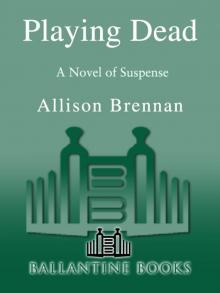 Playing Dead
Playing Dead Cold Snap
Cold Snap Vacation Interrupted
Vacation Interrupted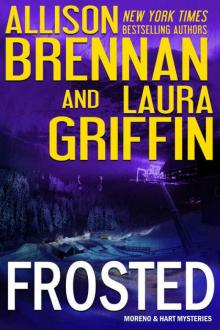 Frosted (Moreno & Hart Mysteries)
Frosted (Moreno & Hart Mysteries)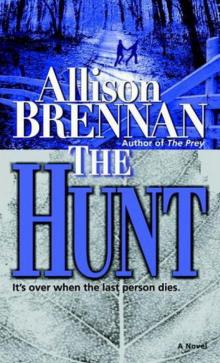 2 - The Hunt
2 - The Hunt Stolen
Stolen No Good Deed
No Good Deed Cutting Edge
Cutting Edge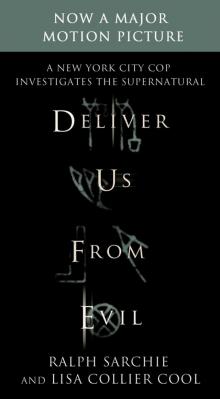 Deliver Us from Evil
Deliver Us from Evil If I Should Die
If I Should Die Speak No Evil
Speak No Evil Silenced lk-4
Silenced lk-4 Original Sin sds-1
Original Sin sds-1 Kiss Me, Kill Me lk-2
Kiss Me, Kill Me lk-2 What You Can’t See
What You Can’t See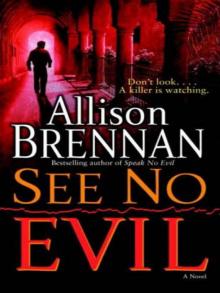 See No Evil
See No Evil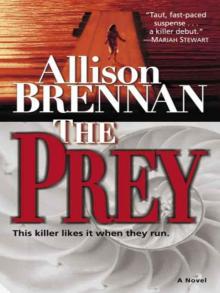 The Prey
The Prey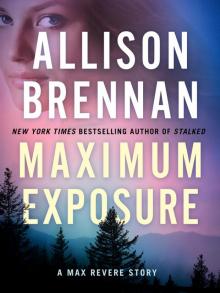 Maximum Exposure
Maximum Exposure Fatal Secrets f-2
Fatal Secrets f-2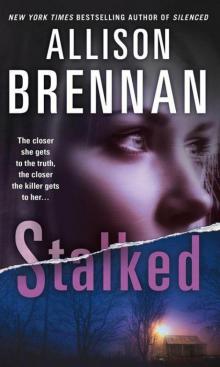 Stalked lk-5
Stalked lk-5 Cutting Edge f-3
Cutting Edge f-3 Hit and Run (Moreno & Hart Mysteries)
Hit and Run (Moreno & Hart Mysteries) Sudden Death f-1
Sudden Death f-1 If I Should Die lk-3
If I Should Die lk-3 Notorious
Notorious Abandoned
Abandoned Fatal Secrets
Fatal Secrets The Hunt
The Hunt Carnal Sin sds-2
Carnal Sin sds-2 Love Is Murder
Love Is Murder Lost and Found
Lost and Found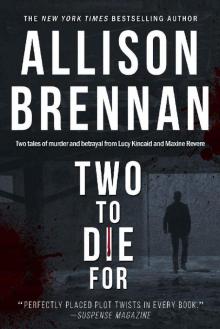 TWO TO DIE FOR
TWO TO DIE FOR Breaking Point
Breaking Point Best Laid Plans
Best Laid Plans Carnal Sin
Carnal Sin Silenced
Silenced Dead Heat
Dead Heat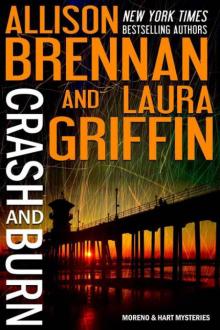 Crash and Burn
Crash and Burn Sudden Death
Sudden Death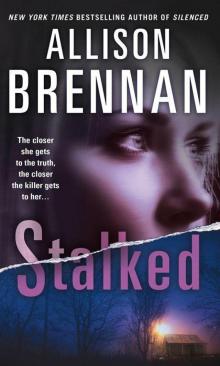 Lucy - 05 - Stalked
Lucy - 05 - Stalked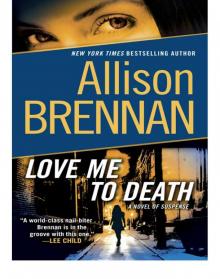 Mortal Sin
Mortal Sin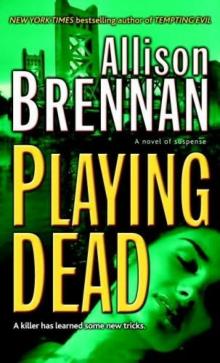 Playing Dead pb-3
Playing Dead pb-3 Kiss Me, Kill Me
Kiss Me, Kill Me Original Sin: The Seven Deadly Sins
Original Sin: The Seven Deadly Sins See No Evil e-2
See No Evil e-2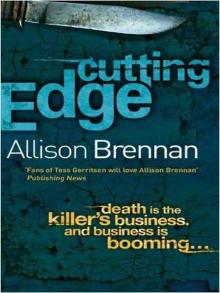 Cutting Edge: A Novel of Suspense
Cutting Edge: A Novel of Suspense Original Sin
Original Sin Too Far Gone
Too Far Gone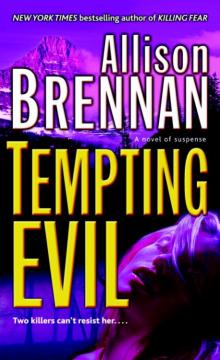 Tempting Evil
Tempting Evil Shattered
Shattered Killing Fear
Killing Fear Murder in the River City
Murder in the River City Love Is Murder (lucy kincaid)
Love Is Murder (lucy kincaid) Stolen (Lucy Kincaid Novels)
Stolen (Lucy Kincaid Novels)